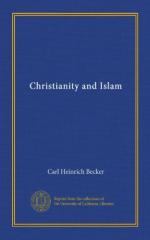I use the term hypotheses, for the reason that the final determination of the points at issue was by no means identical, wherever the Qoran definitely contradicted Christian views of morality or social laws. But in these cases also, Christian ideas were able to impose themselves upon tradition and to issue in practice, even when opposed by the actual text of the Qoran. They did not always pass unquestioned and even on trivial points were obliged to encounter some resistance. The theory of the Sunday was accepted, but that day was not chosen and Friday was preferred: meetings for worship were held in imitation of Christian practice, but attempts to sanctify the day and to proclaim it a day of rest were forbidden: except for the performance of divine service, Friday was an ordinary week-day. When, however, the Qoran was in any sort of harmony with Christianity, the Christian ideas of the age were textually accepted in any further development of the question. The fact is obvious, not only as regards details, but also in the general theory of man’s position upon earth.
* * * * *
Muhammed, the preacher of repentance, had become a temporal prince in Medina; his civil and political administration was ecclesiastical in character, an inevitable result of his position as the apostle of God, whose congregation was at the same time a state. This theory of the state led later theorists unconsciously to follow the lead of Christianity, which regarded the church as supreme in every department of life, and so induced Muhammedanism to adopt views of life and social order which are now styled mediaeval. The theological development of this system is to be attributed chiefly to groups of pious thinkers in




